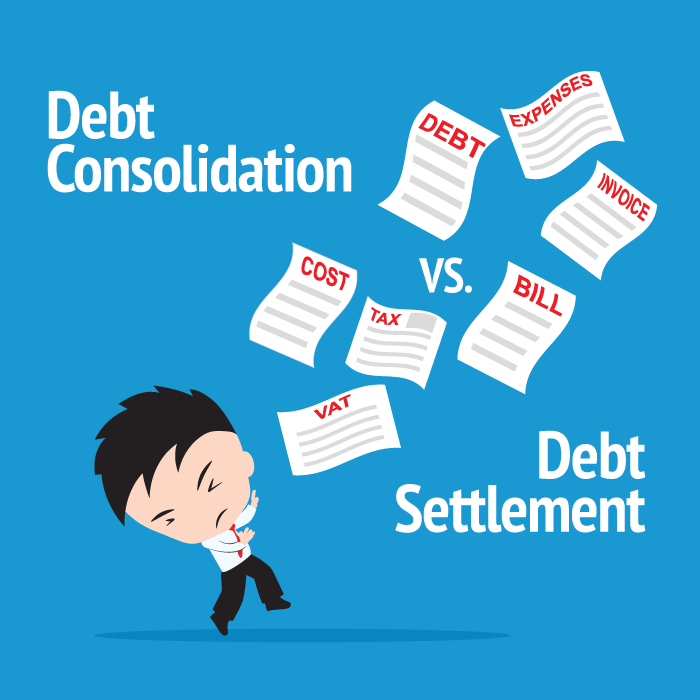![]()
DEBT CONSOLIDATION VS. DEBT SETTLEMENT: THE PROS AND CONS OF EACH FOR YOU TO MAKE A WISE FINANCIAL DECISION
There are several debt-relief programs that you can benefit from, and debt consolidation and debt settlement are two of them. While the first option lets you combine all your bills into one and clear them through one single loan every month, the other involves a negotiation with the different lenders whereby whatever amount of payment you owe to them is reduced after an agreement. Although the latter method is generally exercised with a single creditor to whom you are significantly indebted, you can do it with multiple lenders as well.
The upside and downside of consolidating debt

Consolidating debt is a good idea for consumers who are bogged down by the volume of bills they have to clear each month and who desire to control their spending habits.
One of the primary sources of financial woes for most spenders is credit cards. According to survey reports, every American family owns about three credit cards on average with their debts amounting to more than fifteen thousand dollars. On top of that, they have to pay their rents, phone bills, energy charges, and cable fees among others. To fail to clear even a single credit card bill for a month may cost dearly as from there on it may become an uphill task to catch up with the payments lined up for the next cycle. An ideal way to tackle such a situation is to think of debt consolidation.
The reason why this method works for many people is that it makes your monthly payments manageable and organized. You pay one creditor a month at a fixed date instead of paying a group of them at different deadlines. Another benefit is that there will be a lower interest rate and comparatively less amount of monthly payment to be made.
However, what you may have to be wary of is the fact that your debt will remain the same. It will neither decrease nor be let off. You will face the problem if your payments don’t happen on time and the spending continues to grow.
What are the different methods of consolidating debt?

If you consider this alternative to cope up with your economic struggles, you will need to know about the various processes that can help you achieve your goal. Typically, there are four ways you can consolidate your debt. These include:
- Balance transfer on credit cards
- Debt management plan
- Home equity loan or line of credit
- Personal loans
The first method is available to those with higher credit ratings. It allows a person to transfer a balance from a high-interest credit card to a lower-interest credit card in case the amount of debt payment becomes high. Typically, 2 to 3% transfer fee is charged for this.
The other option is a debt management plan that consists of education programs and credit counselling to detect the reasons behind the piling of debts of the person. The credit advisors can recommend you specific techniques to deal with your obligations. However, it’s important to note that this program may take 3 to 5 years to show effective results. For that, you need to have a lot of patience.
The choice of home equity is also interesting as it offers low-interest charges. But the problem is your home will be at stake as this is what you give as a guarantee. That means if you don’t pay on time, you may risk losing your home. Besides, the scheme can involve closing costs and application fees also.
Lastly, there is a way of personal loan. Online creditors, banks, and other financial institutions can help you with this. It generally comes for a lower interest price compared to credit cards. The rates may vary though. Some personal loans require you to pay upfront fees, some ask for prepay, and others demand collateral, such as a property. To apply for a loan, you need to maintain a good credit score.
In case the amount of debt exceeds your earnings, it will be difficult for you to get one.
For more information on debt consolidation and the viable options, consider visiting Nationaldebtrelief.com or any such credible website. It will help you learn more about how you can manage your finances well.
The upside and downside of settling a debt

The very thought of having to pay less than what you owe may make it an attractive proposition for you.
But the risks associated with this kind of program are far more significant. Suppose that you or someone on your behalf negotiate with a creditor to reduce the amount of debt in exchange for full payment. You were liable to pay him $10,000, and after negotiation, it came down to $5,000. You pay him, and the matter gets sorted out. It’s a win-win situation if you have only one creditor. In case there are multiple lenders, you will have to follow this process with everyone to eliminate your debt. Meanwhile, the interest rate and late fees will keep spiralling up.
However, that is only one of the many downsides that it has. There are several more, such as influence on your credit rating, tax payments, etc. Failing to pay full amount is seen as harmful in case of credit score, and hence your credit rating will likely slip down. The revenue department of the USA may consider the forgiven amount as income and therefore may make it taxable. Apart from that, you can accrue late fees, interest charges and several other costs in addition to the amount of debt you need to pay when dealing with a debt settlement firm because it may advise you not to pay your lenders during the negotiation process.
From this, one thing is clear that if you are deep in debts and there is no other solution available, then only the choice of settling debts makes sense. It can save you from facing bankruptcy. But if you have an opportunity, going with debt management can prove to be immensely useful as it can help you recover your credit score too.
























